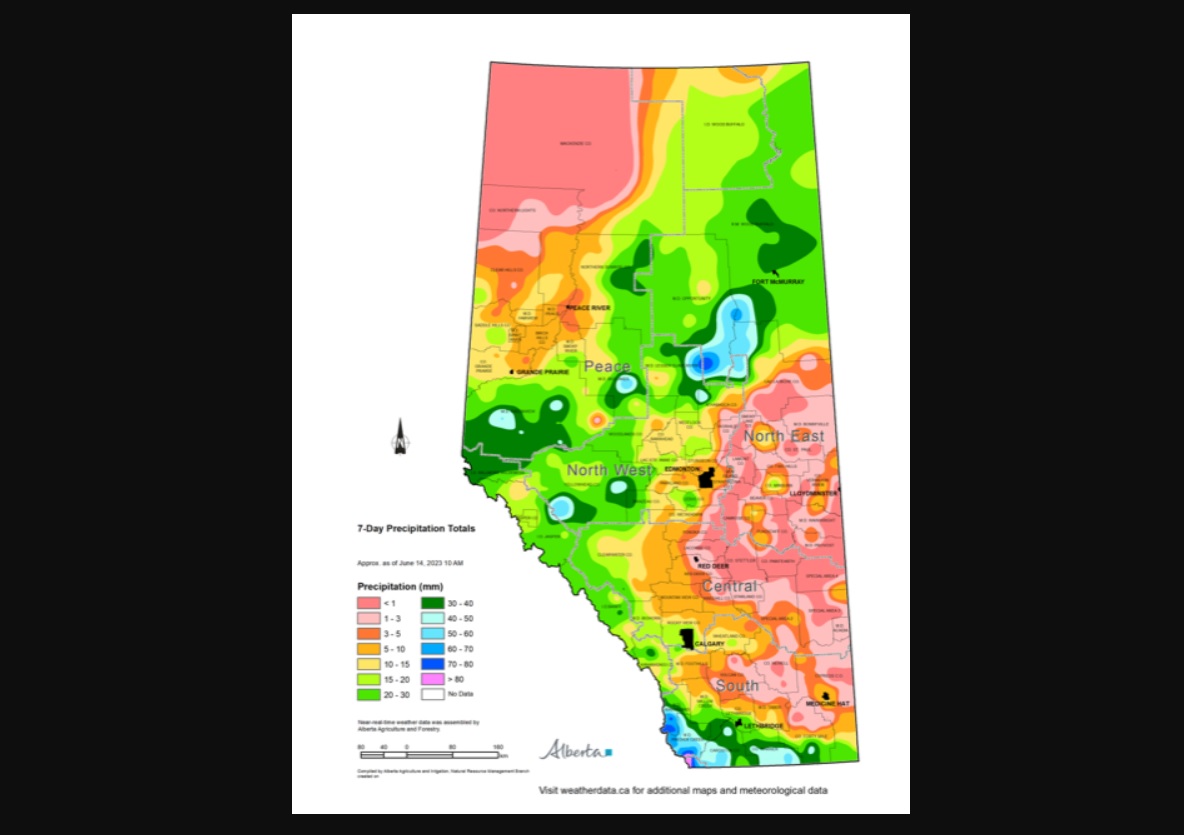A very light snowpack, no run-off, an early and extended heat wave and no moisture forced the county of Stettler to declare an agricultural disaster on Wednesday.

“We’re seeing exceptionally large numbers of livestock being dispersed at auction marts for this time of year, and producers are contacting us to report they are out of feed, cannot afford feed and looking ahead and realizing at this point that the probability of growing feed to support their operations is very, very slim,” said Reeve Larry Clarke.
“Agriculture is a very big part of what we do here in Stettler County and of what fuels our economy and lives. We are hearing the pleas from our farmers and producers and we need to take action,” he said.
The reeve said declaring a disaster triggers options for producers and farmers like income deferral programs.
“What worries me is what it could do to the cost of groceries, what it could do to the cost for Albertans, people we export to, just to basically live day to day.
“This is really widespread,” Clarke said.
Councillors said recent moisture maps, current conditions, as well as empty dugouts and wetlands throughout the region support the serious declaration.
Miles Armstrong, who’s been a cattle and grain farmer with his family since 2009, said he’s never experienced conditions this dry in June.

Get daily National news
“A desert. We’ve never seen anything like it.
“With such a lack of moisture, we just don’t know how we’re going to get our cows through and have enough feed to keep going on next year.”
Armstrong said they’ll likely have to reseed.
“We have no idea what to do. None of the neighbours know, none of the old guys know. It’s something we’ve never seen before — a drought this early, this hard. We’ve seen it in July, August and September, but never this early.”
Right now, livestock are surviving on whatever they can find on the ground or in trees and bushes, Armstrong said. They haven’t had to sell any yet.
“We’re hoping it’s not too little too late. We’re hoping the rain comes in enough time to make a crop, to make feed, but we don’t know. We’ll have to just see.
“It is what it is. You can’t control the weather,” he added. “I try not to get too worked up.”

Clarke, who is also a farmer and cattle producer in addition to serving as reeve, said the early dry conditions mean trouble.
“A lot of people are running out of water on their properties. They would water the cattle on a dugout or creeks or beaver runs, and there’s no water in them anymore, so they’re hauling treatment water from water fill facilities to water their cattle.
“People’s wells are going dry,” he said.
What little rain the area has seen has been varied, Clarke said.
“It’s a Band-Aid on a gaping wound because if this winds keeps up, it’ll just dry it up.”
There has been some rain since Wednesday, when the declaration was made. But it’s only been between half an inch to two inches, said Quinton Beaumont, Stettler’s manager of agricultural operations.
“There’s little to no moisture in the ground for seed to grow.”
He said June is typically rainy season.
“It’s very concerning.
“It affects livestock because not only are our crops not growing, our hay lands aren’t growing… Our pastures haven’t really recovered from last year’s grazing. There’s nothing for them to eat.
“If we can’t get a good crop, if we can’t get feed for our livestock, we can’t help feed anyone else.”
Beaumont said half an inch of rain every day for the next three weeks could turn things around.
“There’s always hope… but it’s not looking good.”

The county is urging the provincial and federal governments to support the agriculture industry battling drought.
“The Alberta government has announced some pasture programs in light of the lack of pasture due to the wildfire situation in our province,” he said. “While that is not a consideration in our area, we are seeing producers putting herds out into their hay fields, with no other options at hand beyond herd dispersals.”
In a statement, the province said:
“We constantly monitor crop and water supply conditions across Alberta and maintain regular communication with industry experts to ensure our data is up to date.
“Dry conditions are a top concern for Alberta Agriculture and Irrigation and we know this season has been a difficult one for many farmers across Alberta.
“Alberta’s government remains committed to ensuring the viability of our agriculture industry and we are looking into options to support impacted producers.
“Alberta’s Water Pumping Program is also available to help producers secure adequate water supplies for domestic, livestock or agricultural uses.”
The county said Stettler is the first municipality to declare an agricultural disaster in Alberta this year due to drought. But neither Clarke nor Beaumont expect Stettler will be the last.
Stettler is located about 185 kilometres south-southeast of Edmonton and about 80 kilometres east of Red Deer.







Comments
Want to discuss? Please read our Commenting Policy first.